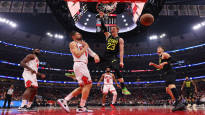Lauri Markkanen the highlights did not help Utah win the basketball league NBA. The team lost 113–130 to the Finnish star’s former club Chicago on the away court.
Markkanen was the match’s top scorer with 29 points. The Finn was also, as usual, extremely accurate and efficient in his throws. Among other things, he hit all three of his two-point shots and all eight of his free throws.
In addition to Markkanen, four Utah players reached double-digit points, but the team remained firmly in the chase throughout the match. The main reason for this was familiar from the beginning of the season: a staggering amount of ball losses.
In the opening half, the team lost the ball in its attack no less than 14 times. 10 of these came in the second quarter.
– Losses of the ball ruined our game today. The opponent scored 30 of them. It’s hard to win like that, Utah head coach Will Hardy spoke at the press conference.
In the early season, Utah has lost the ball as many as 17.8 times per game. This is the highest reading in the entire league, which does not flatter the Jazz, who are in second last place in the Western Conference.
Direct speech from the head coach
Hardy spoke in his usual calm manner at the press conference, but the 35-year-old head coach’s statements were heavy. He saw that the team sometimes fell into carrying the ball too long in the attacking end, which contributed to turnovers.
– We drove too long, and drove unnecessarily deep in the attacking end before we made a decision, Hardy analyzed.
He said that the team needs to make decisions earlier. Losses of the ball and poor ball movement received harsh criticism from the analytical coach.
– Sometimes we play well, but sometimes we play really ugly basketball, like for example today in the second quarter. We’re in trouble when things start going bad in a match, Hardy charged.
He also estimates that the team does not recognize different situations accurately enough on the offensive end. He used the example of Chicago’s so-called switching defense tactics, which provided opportunities for Utah.
– We were able to create an advantage, but we just didn’t recognize these moments on the field. In the best teams, everyone recognizes the same things, Hardy estimates.
He gave a concrete example of summer procurement to John Collins touching.
– When John gets a favored defender near the basket without the ball, the player with the ball should notice this. In addition, the other player without the ball must recognize the situation so that he does not move to the basket and take away John’s space, Hardy said.
Open talk about playing in the back
Against Chicago, of the team’s starting backs, both, and Jordan Clarkson that Talen Horton-Tucker, collected five turnovers to a man. Hardy was asked about playing as a duo, to which Hardy answered comprehensively.
– I think both run into problems when they carry the ball too far, Hardy said.
He praised the duo’s activities in training and video meetings.
– I believe that both will try to pass. There are just moments when we push ourselves to carry too much, Hardy said.
He estimated that Horton-Tucker lost the ball a few times because he didn’t know how to expect the opponent to be so close. Clarkson, on the other hand, left Hardy in without throwing in situations where he could have thrown. Instead, the guy in the back ended up driving for too long.
Hardy talked a lot about the team’s learning process and development. Finally, he stressed how important it is for the coach to try to tell the players in a suitable way, for example in the case of Clarkson and Horton-Tucker.
– I always try to take into account the personalities of both and convey the message in a way that I believe will be heard and understood, Hardy said.
There is little time for training during the season, but Hardy and his coaching teams try to use all possible time to develop the team.
– We treat game day training like actual training. We try to maximize every minute that we are together, both in voluntary training sessions and in video meetings, Hardy opened his operating principles.
